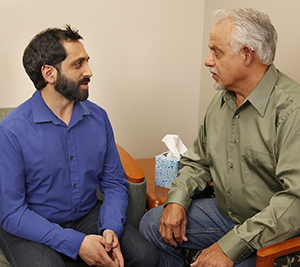Post-traumatic stress disorder (PTSD) is a series of symptoms that happen after a distressing event. You may have anxiety, anger, and bad dreams. PTSD can happen after things like a car crash, rape, military combat, or violent crime. The symptoms of PTSD can cause problems with relationships. They can make it hard to cope with daily life. But PTSD can be treated. With help, you can feel better.
How does it feel?
Symptoms of PTSD often start within a few months of the event. Here are some common symptoms:
-
You startle more easily and feel anxious and on edge all the time. This can lead to sleep problems. It can make you feel overwhelmed.
-
You may become angry or upset more easily.
-
You may have panic attacks. These are sudden, intense feelings of fear and doom.
-
You relive the event in bad dreams and flashbacks. During these, you may feel strong emotions and as though you’re reliving the event.
-
You stay away from people, places, or activities that remind you of the trauma. You may hold in your emotions and feel numb.
-
It may be hard to focus at work or school or to relax with friends. You may be afraid to let people get close to you.
-
You may have trouble remembering parts of the event.
-
You may have bad thoughts about yourself and feelings of guilt and shame.
Who does it affect?
Not everyone who survives a trauma will have PTSD. But many will. PTSD can happen to anyone. But it most often happens after a person feels their life, or someone else's, is threatened.
A person is at risk for PTSD after any of these:
-
Rape or sexual abuse
-
A mugging or carjacking
-
A murder or violent crime
-
A mass shooting
-
A car accident or plane crash
-
A life-threatening illness
-
War
-
Domestic violence
-
Childhood abuse
-
Natural disasters such as earthquakes, floods, or hurricanes
-
The sudden death of a loved one
Getting help
The first step is to talk with a counselor or health care provider. They can help you take the next step to treatment. There are different kinds of treatment that can help PTSD. Treatment can help you cope with the emotions from the trauma and can help change the way your body reacts to the memories of the event. You also may get medicine. These treatments include:
-
Talk therapy (trauma-focused psychotherapy).
-
Eye movement desensitization and reprocessing (EMDR).
-
Prolonged exposure (PE).
-
Cognitive processing therapy (CPT).
-
Medicine.
Are you having suicidal thoughts?
You may be feeling helpless, hopeless, and that you can’t go on. You may even have thoughts of suicide. But there is help for you. There are ways to ease this pain and manage the problems in your life.
If you are thinking about harming yourself or others, call or text 988 right away. You will be connected to a trained crisis counselor at the 988 Suicide & Crisis Lifeline.
An online chat option is also available at . The Lifeline is free and available 24/7.
To learn more
-
American Psychiatric Association: 888-357-7924, www.psychiatry.org/patients-families/ptsd
-
National Center for PTSD:www.ptsd.va.gov
-
National Alliance on Mental Illness:www.nami.org
-
Mental Health America:www.nmha.org
-
988 Suicide & Crisis Lifeline: 988, 988lifeline.org


